Is it ok to drink tea during pregnancy? And if so, which ones are safe?
Pregnancy can be such a magical time, but it is also often fraught with questions about what is safe and what’s not. Thankfully, it is considered safe to drink tea during pregnancy, depending on the variety. Certain types of tea, which may help prepare your body to prepare for labor, should only be consumed later in pregnancy, while other types of herbal tea should be avoided altogether. It’s also important to consider the caffeine content of tea. The good news is that there are some teas likely considered safe to enjoy during pregnancy!

This is not a comprehensive list of which teas are safe and unsafe during pregnancy. It’s important to consult your doctor or medical team if you have questions or before drinking any teas during pregnancy. The other thing to note is that research regarding tea and pregnancy in general is lacking. Teas listed as “unsafe” may be classified that way simply because there’s no research on possible impacts.
Here’s what to know.
Learn more about the different types of teas.
Be aware of caffeine intake:
One of the biggest considerations when it comes to drinking tea during pregnancy is caffeine content. The American College of Obstetricians and Gynecologists recommends that pregnant women limit their caffeine consumption to 200 mg per day or less, while the World Health Organization (WHO) recommends no more than 300 mg per day.
Caffeine easily passes through the placenta, and babies have a difficult time breaking it down due to their immature livers. High caffeine intake (greater than current recommendations) has been linked to lower birth weights, birth defects, and a greater risk of miscarriage.
As different types of tea can contain different quantities of caffeine, it’s important to keep an eye on your total caffeine consumption in order to make an informed decision on what’s right for you. There are also caffeine-free options if you’d like to avoid caffeine altogether.
Consider quality:
Tea, as with other foods and beverages, can contain contaminants such as heavy metals, microplastics, and pesticides, so it’s important to think about the quality of tea you’re drinking, especially in pregnancy. One study found that 20% of off-the-shelf brands of white, black, and green tea were contaminated with aluminum and that 73% of tea samples had unsafe levels of lead. Since tea is not strictly regulated or tested, it’s important to buy from reputable brands. Here at Matcha.com, we have strict testing standards, so you never have to worry about heavy metals or contaminants in your matcha tea powder. We also use potato starch instead of plastic for our tea bags. If using a tea bag, look for bags that are made of natural fibers instead of plastic.
Ginger Tea
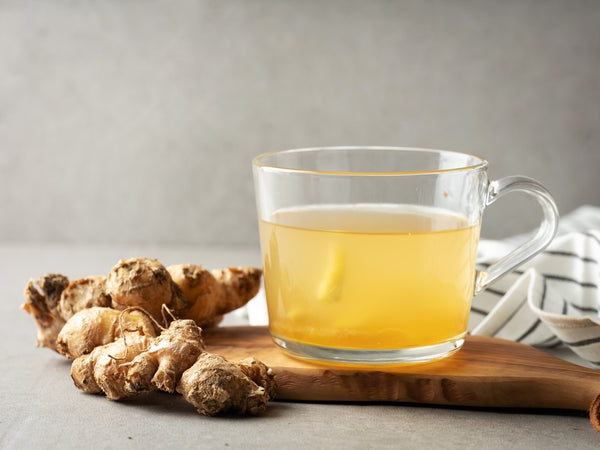
Ginger is a very well-researched herb in pregnancy and may help with general nausea, morning sickness, and heartburn. Eating ginger or drinking tea in moderation and as part of a balanced diet is not known to cause any problems in either breastfeeding or pregnancy. It is also caffeine-free, making it a good option for anyone concerned with caffeine in pregnancy.
Peppermint
Peppermint tea is generally considered safe during pregnancy and is thought to help with digestion, gas, and possibly heartburn. There are some warnings to avoid large amounts of peppermint in the first trimester as it may promote menstruation, however. Some say that peppermint should also be limited when breastfeeding as it may cause milk supply to dip. However, no human studies have shown that peppermint is effective at treating any of these symptoms or that it causes a dip in milk supply. Ultimately, more research is needed; however, it is still considered safe by most to be safe in pregnancy.
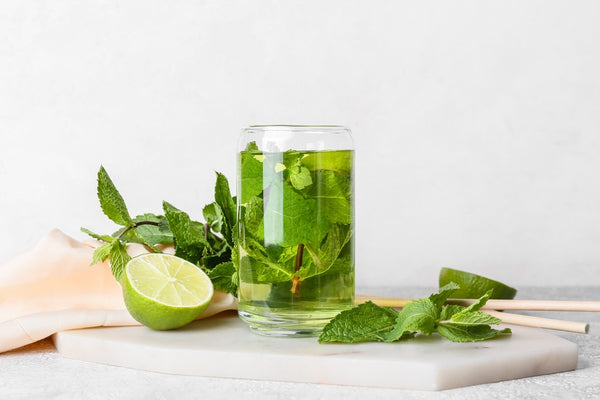
Red Raspberry Leaf
Red Raspberry leaf is often included in pregnancy tea mixes and can also be consumed on its own. Some research studies show that raspberry leaf can help prepare the uterus for birth, shorten labor time, and reduce pain during labor. Because it is used to help prep the body for labor, many recommend holding off on drinking raspberry leaf tea until later in your third trimester.
Matcha
Matcha and other types of green tea are generally recognized to be safe in pregnancy and can be a lower caffeine option for anyone looking for an alternative to coffee. However, since matcha does contain caffeine, it is important to take into account your total caffeine consumption that day. Matcha is especially high in antioxidants, which have been shown in studies to be beneficial for overall health. l-theanine, an amino acid found in matcha, works to combat any negative side effects of caffeine, giving you an alert yet relaxed feeling. Something many mamas-to-be may need!
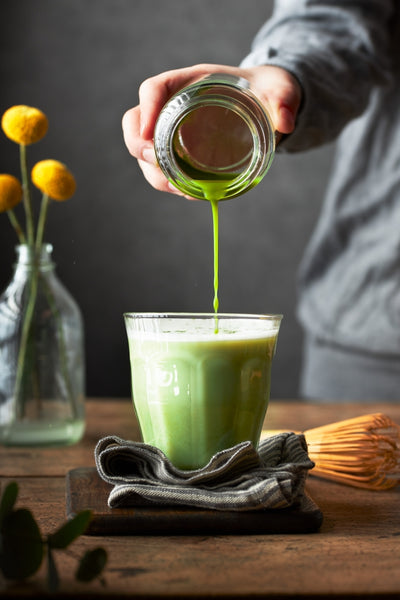
Lemon Balm
Lemon balm tea is often used to help reduce stress and anxiety and may improve sleep and digestion. Opinions on the safety of lemon balm tea in pregnancy are mixed. Some health organizations say that it is unsafe in pregnancy, while others say that it is ok in moderation. This is likely due to the fact that it hasn’t been well-researched in pregnancy. There are also no human clinical trials to support the claims of lemon balm’s health benefits.
Black & White Tea
Similar to matcha, black and white tea are largely considered safe in pregnancy, but they do contain caffeine. As long as total caffeine content is taken into account and caffeine consumption is limited to 200 mg total, most agree that black tea and white tea are safe to drink.
Licorice Tea
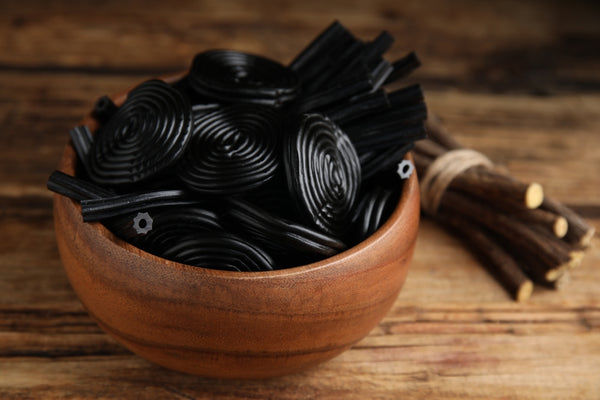
It is recommended to avoid licorice and licorice tea during pregnancy as it may affect cognitive abilities of children later in life. One study conducted in Finland found that women who consumed a large amount of licorice in pregnancy had babies with lower IQs and higher rates of ADHD. The authors of the study did note that they couldn’t determine whether these results were truly from licorice exposure or due to other factors; however, most health professionals recommend avoiding licorice in pregnancy.
Black Cohosh
Black cohosh is considered possibly unsafe in pregnancy and during breastfeeding as studies suggest it may cause uterine contractions, which may lead to preterm labor. Caution is suggested due to limited studies on its safety in pregnancy and while breastfeeding.
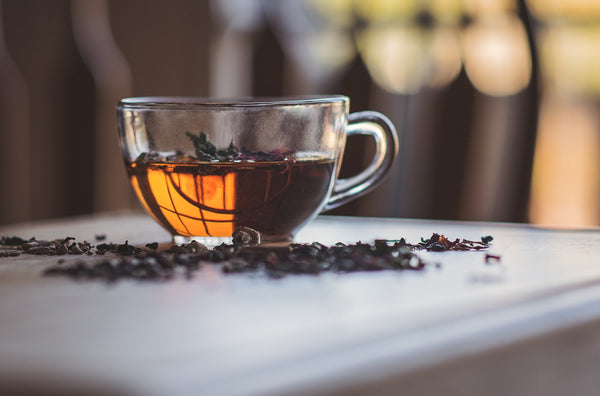
Chamomile
Opinions are mixed on the safety of chamomile in pregnancy. In moderation, it appears that chamomile is safe while pregnant. However, large amounts (more than 4 cups per day) may stimulate uterine contractions or cause circulatory problems. Large quantities may also increase the risk of miscarriage, preterm labor, or low birth weight.
Hibiscus
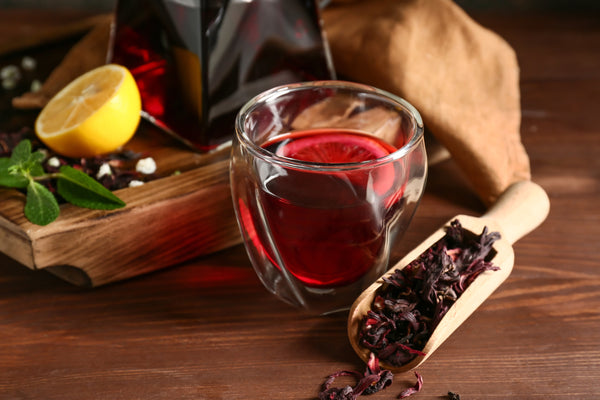
Hibiscus tea is generally not recommended in pregnancy as it may trigger preterm labor and cause low blood pressure. Most studies conducted on hibiscus have been done on animals and as a supplement (a much larger dose) rather than tea. However, it is generally advised to skip hibiscus while pregnant or breastfeeding.
Bottom Line:
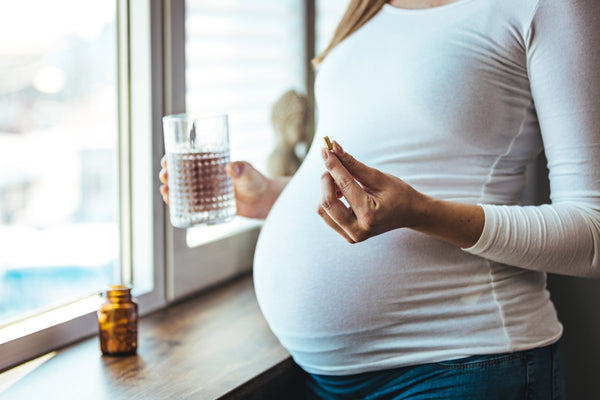
In general, black, white, and green tea (including matcha) are considered safe in pregnancy, although it’s important to moderate caffeine consumption. It’s recommended to stay away from many herbal teas, but peppermint, ginger, and lemon balm do appear to be safe, as well as red raspberry leaf later in pregnancy. Overall, it’s tough to say with certainty which teas are safe and which teas are unsafe due to the lack of definitive research and human clinical trials. It’s important to ask any questions you have about the safety of certain teas with your medical team before consuming them.
Disclaimer: These statements in this blog post have not been evaluated by the Food and Drug Administration. The information provided here is for educational purposes only and should not be considered medical advice. It's essential to consult with a qualified healthcare professional before making any dietary or lifestyle changes.
Resources:
Blitz MJ, Smith-Levitin M, Rochelson B. Severe Hyponatremia Associated with Use of Black Cohosh during Prolonged Labor and Unsuccessful Home Birth. AJP Rep. 2016 Mar;6(1):e121-4. doi: 10.1055/s-0036-1579537. PMID: 26989565; PMCID: PMC4794442.
Dante G, Pedrielli G, Annessi E, Facchinetti F. Herb remedies during pregnancy: a systematic review of controlled clinical trials. J Matern Fetal Neonatal Med. 2013 Feb;26(3):306-12. doi: 10.3109/14767058.2012.722732. Epub 2012 Oct 24. PMID: 22928540.
Drugs and Lactation Database (LactMed®) [Internet]. Bethesda (MD): National Institute of Child Health and Human Development; 2006-. Peppermint. [Updated 2023 Aug 15]. Available from: https://www.ncbi.nlm.nih.gov/books/NBK501851/
Mother To Baby | Fact Sheets [Internet]. Brentwood (TN): Organization of Teratology Information Specialists (OTIS); 1994-. Ginger. 2023 Jan. Available from: https://www.ncbi.nlm.nih.gov/books/NBK582731/
Räikkönen K, Martikainen S, Pesonen AK, Lahti J, Heinonen K, Pyhälä R, Lahti M, Tuovinen S, Wehkalampi K, Sammallahti S, Kuula L, Andersson S, Eriksson JG, Ortega-Alonso A, Reynolds RM, Strandberg TE, Seckl JR, Kajantie E. Maternal Licorice Consumption During Pregnancy and Pubertal, Cognitive, and Psychiatric Outcomes in Children. Am J Epidemiol. 2017 Mar 1;185(5):317-328. doi: 10.1093/aje/kww172. PMID: 28158597.
Rhee J, Kim R, Kim Y, Tam M, Lai Y, Keum N, Oldenburg CE. Maternal Caffeine Consumption during Pregnancy and Risk of Low Birth Weight: A Dose-Response Meta-Analysis of Observational Studies. PLoS One. 2015 Jul 20;10(7):e0132334. doi: 10.1371/journal.pone.0132334. PMID: 26193706; PMCID: PMC4507998.
Schwalfenberg G, Genuis SJ, Rodushkin I. The benefits and risks of consuming brewed tea: beware of toxic element contamination. J Toxicol. 2013;2013:370460. doi: 10.1155/2013/370460. Epub 2013 Oct 23. PMID: 24260033; PMCID: PMC3821942.
Terzioglu Bebitoglu B. Frequently Used Herbal Teas During Pregnancy - Short Update. Medeni Med J. 2020;35(1):55-61. doi: 10.5222/MMJ.2020.69851. Epub 2020 Feb 28. PMID: 32733750; PMCID: PMC7384490.







